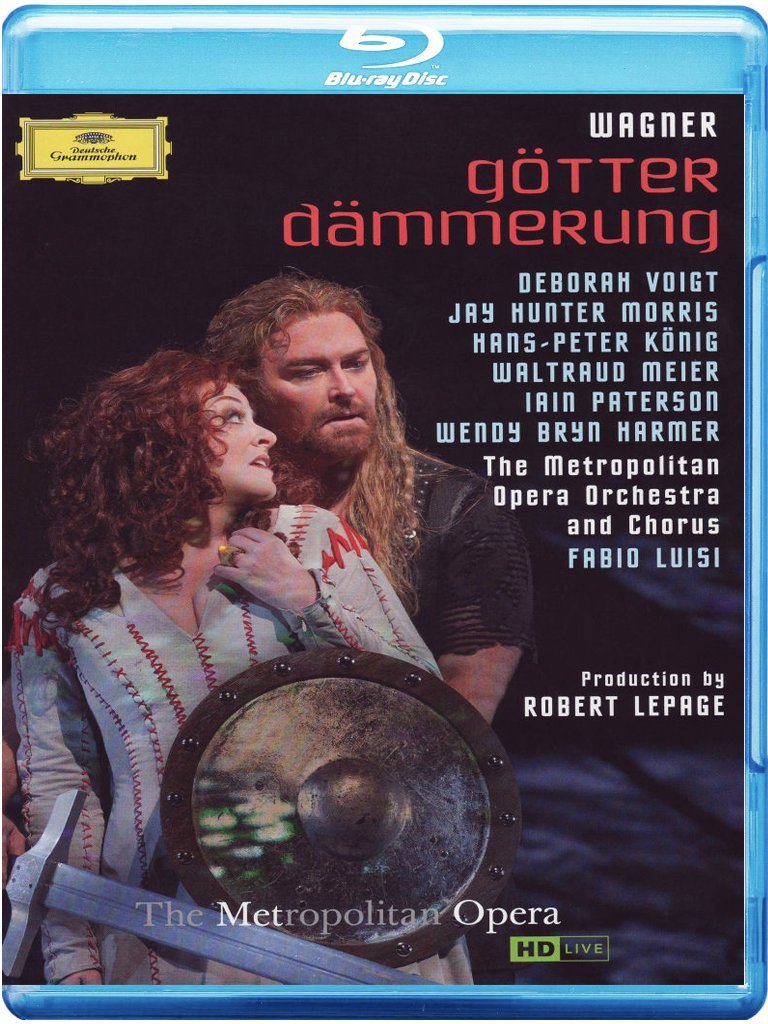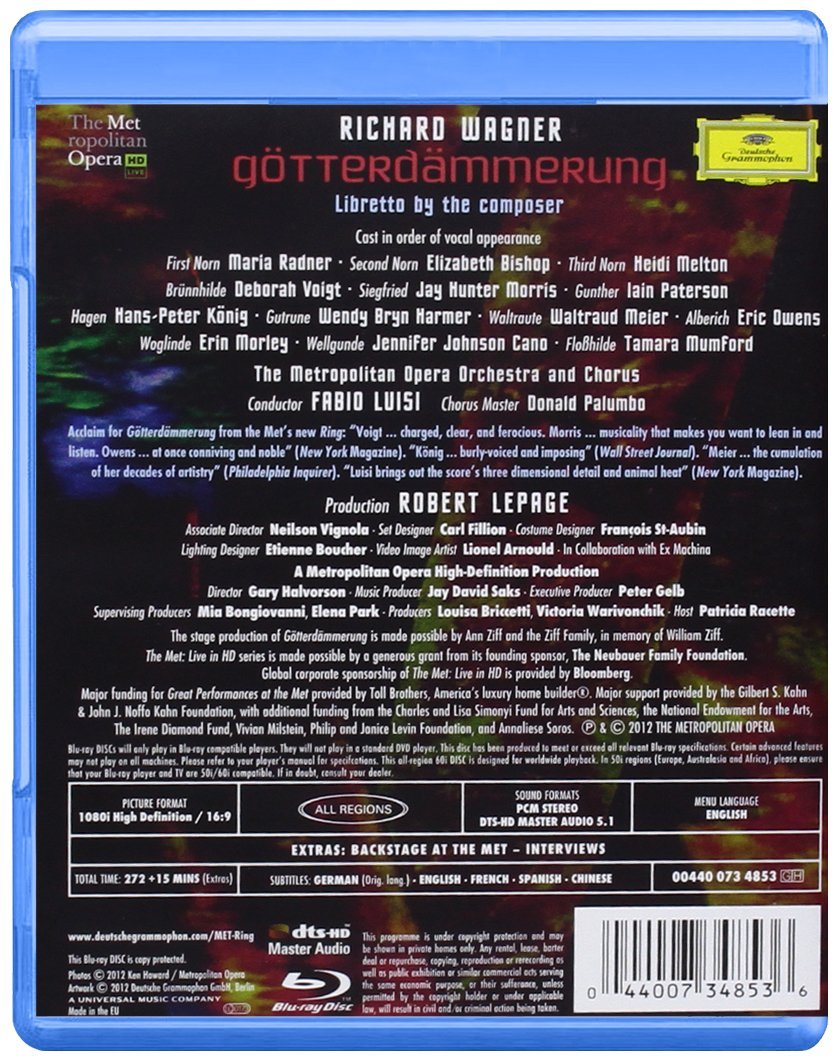

Wagner Götterdämmerung opera. Directed 2012 by Robert Lepage. Stars Maria Radner (First Norn), Elizabeth Bishop (Second Norn), Heidi Melton (Third Norn), Deborah Voigt (Brünnhilde), Jay Hunter Morris (Siegfried), Iain Paterson (Gunther), Hans-Peter König (Hagen), Wendy Bryn Harper (Gutrune), Waltraud Meier (Waltraute), Eric Owens (Alberich), Erin Morley (Woglinde), Jennifer Johnson Cano (Wellgunde), and Tamara Mumford (Floßhilde). Fabio Luisi conducts the Metropolitan Opera Orchestra and Chorus (Chorus Master Donald Palumbo). Associate Direction by Neilson Vignola; set design by Carl Fillion; costume design by François St.-Aubin; lighting design by Etienne Boucher; video image art by Lionel Arnould in collaboration with Ex Machina. Directed for TV by Gary Halvorson; music produced by Jay David Saks. Released 2012, disc has 5.1 dts-HD Master Audio sound. Grade: A+
Note that this disc is also available in the Ring des Nibelungen box set published by Deutsche Grammophon. Before you read the mini-review below for Das Rheingold, you might read our write-up for entire Met Ring set.
In addition to old friends, we have several new singers: Iain Paterson sings Gunther and Waltraud Meier, who stars in HDVDs such as Lohengrin and Elektra, sings the short role of Waltraute, Brünnhilde's sister. The new character Gutrune is sung by Wendy Bryn Harmer. She also sang Freia in Das Rheingold and was one of the Walkürie sisters, but I didn't remember her well enough from the other roles to get confused. Hans-Peter König, who sings the new role of Hagen, also was in all the earlier operas, but his costumes and make up are so different in each of his parts that no confusion results. (König is the only star to sing in all 4 of the Ring operas.)
The Met's production of this Götterdämmerung has all the good qualities I've praised in earlier reviews, and it also gets an A+ . Here I'll make a few more general comments that come to mind as I finish reviewing the Met Ring set.
Götterdämmerung is tricky to follow. It has 3 stage conventions that can leave your brain spinning: (1) there is a love potion that results in an unbelievable change of love interest (2) the magic helmet (Tarnhelm) is used to bring about an unbelievable impersonation, and (3) there's a dream scene in which we learn that Hagen is child of Alberich. I wonder if anyone tried after 1875 to sell a theater ticket to any new work with either a love potion or a magic impersonation. I suspect Wagner's Götterdämmerung is the end of the line for this sort of plot element.
In the first 3 operas in the Ring, we track the fortunes of 3 "races" on earth, the gnomes, the giants, and the gods, all of whom hoped to dominate the earth and it's 4th race: the humans. By the end of Götterdämmerung, the gnomes, giants, and gods are finished. The humans are left to handle the world, and this as the world was fast approaching the 20th century.
Götterdämmerung was first produced in 1875. Wagner died 1883. Optimists say that Wagner believed in the perfectibility of man. He thought humans would do well with the next century and beyond. Cynics say Wagner, an anti-Semite, was just part of a vast movement in the German-language sphere to claim world hegemony for Germans and conduct ethnic cleansing. Within 50 years after Wagner's death, Adolf Hitler was Wotan (Chancellor of Germany). Within 12 years after that, 50,000,000 people died as a result of Wotan's decisions. Hitler himself was an artist and early multi-media superstar who used Wagner's music as part of his sales pitch.
To decide what to make of Wagner, you first have to know the music. If you think the music has value, the next inquiry must deal with Wagner's record as a man and with his philosophical/political writings. If you conclude that Wagner was evil or had evil ideas, then you have to decide if you can separate the man from the music. This might be tough. Wagner did not write a lot of abstract music. He was keenly interested in the intellectual "meaning" of his works.
Many well-informed people still take Marx seriously even after the fall of Stalinism in most of the world. The connection between Marx and Communism would obviously be far clearer than an alleged connection between Wagner and National Socialism. But the relationships are analogous.